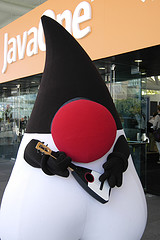Tim, the curator of LibraryThing, has a mega-post about tagging. Tim compares the tagging systems of Amazon and LibraryThing and postulates why LibraryThing users have applied ten times
the number of tags that Amazon users have, even though the number of
LibraryThing users is so much smaller than Amazon users. Tim goes on to
offer advice as to how to make an eCommerce tagging work (with a hint
that perhaps it is not too late for Amazon can catch up if they can
scrape together about $5.76)
Tim talks about the problem with
'opinion tags' especially when tagging is light. Tim points to the
difference in tags for Ann Coulter's book 'Terrorism' - Amazon has
user tags like "craptacular," "evil" and "brain dead while
LibraryThing's has tags like 20th century(1) 21st c.(1) america 1975-present(1) American History(1) cold war(2) commentary(2) Conservatism-
I find it interesting that none of the LibraryThing tags are opinion
based, while almost all of Amazon's tags are. I think this may
point more to a cultural difference between LibraryThing and Amazon's
users. Amazon has a long history of cultivating a culture of critique.
Amazon users are accustomed to and encouraged to offer their opinions
about everything they see on Amazon. Amazon's customers write
reviews, they rate products, they make lists of products that they
recommend. With this culture of critique it is not surprising
that Amazon's tags are opinion-centered. LibraryThing, on the other
hand, is more oriented toward people who want to organize their book
collections. With this culture of organization, we see tags that are more subject-oriented. Amazon's tags are essentially one word reviews, while LibraryThings are one word descriptions.
Tim talks about why people tag without using the word selfish.
I think the best tagging systems (last.fm, delicious, and LibraryThing
come to mind) work well because the prime motivation for tagging is a
selfish one - people tag to organize their personal stuff (whether it is
music, the web, or books). A system like last.fm or
LibraryThing aggregates these thousands of selfish behaviors for the
good of all.
It's clear from Tim's post that Tim spends a lot of
time thinking about tagging. I'm guessing that it is Tim's passion
for tagging that is at the heart of the success of LibraryThing.
Tim is asking a lot of interesting questions about tagging - and he has
the luxury of being able to try out his theories about tagging on a site
with hundreds of thousands of users and millions and millions of
tags - that is a luxury that very few people have.
 My
My 